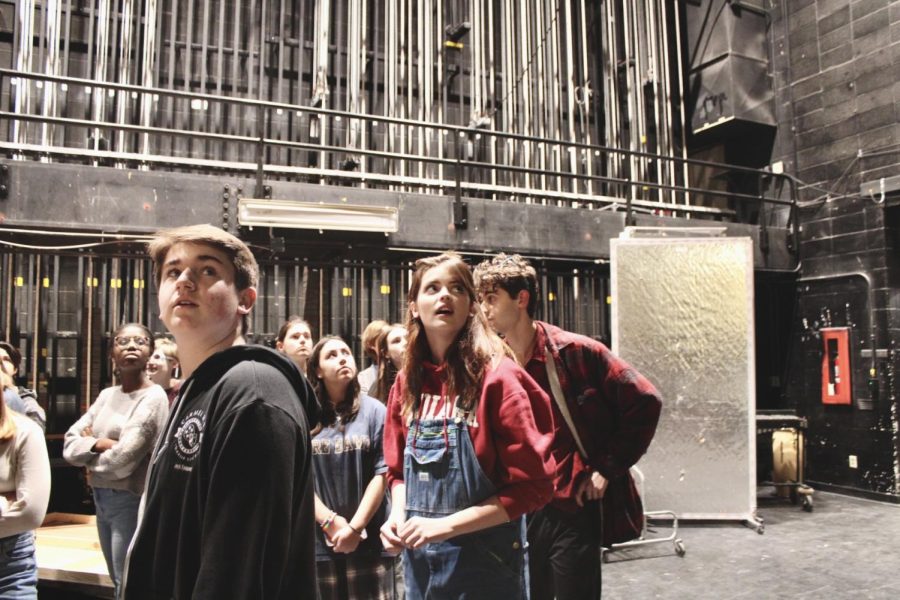January is National Rising Stars Month, and it aims to draw attention to people looking to showcase their talents. As junior Sam Tiek gets closer to graduating, he said he decided to continue his musical theater hobby and talents as a career.
“It’s something I’ve always wanted to do and I’m in the beginning stages of honing my skills as a vocalist, dancer and actor,” he said. “I’ve begun meeting with different audition coaches and college counselors to try and see where would be a good fit for me and what else the school has to offer.”
But Tiek said his decision hasn’t been easy. He said it is difficult for people like him who want to pursue a career in the performing arts.
“I believe the biggest difficulty with subjective careers like the performing arts is hearing ‘no’ constantly,” he said. “You have to really want it and be willing to persevere through all the rejection.”
Similar to Tiek, Anne Beck, Young Artists Program coordinator at Civic Theatre and assistant teaching professor of Musical Theatre and Jazz Dance at Ball State University, said when she was younger she aspired to continue her musical theater dreams and was even in a Broadway show and numerous national tours.
“I went to college for dance education and musical theater performance. In New York, I did the original Broadway company of ‘Saturday Night Fever’ opening to close, August 1999 to October 2001,” she said via email.
But her journey also had challenges. “I was told I couldn’t sing in high school. Then four years after college was my first leading role on Broadway playing Stephanie Mangano (in ‘Saturday Night Fever’) and I stood alone on a stage singing a solo. (That) is a story I like to pass onto my students when they think something is not attainable.”
Ella Asher, president of Rising Stars club and senior, said she doesn’t want to go into performing like Tiek, but rather wants to go into other art fields including but not limited to the designing of theater sets and sculptures. However, with her extended experience in theater and performing, she said she agreed with Tiek’s encouragement, but she continued that rejection can lead to other difficulties.
“Just the style of living in general (can be difficult) because you have to get a job (in a theater production), work that job, maybe it makes enough, and then right afterwards you’re flat on your butt again,” she said. “(Theater is) just not consistent or safe really. I commend people that do it because if you love performing so much and that’s what you wanna do and you’re willing to sacrifice your own peace for that, it’s respectable.”
Ryan Dafforn, vice president of CHS’s chapter of United States Institute for Theatre Technology (USITT) and senior, said he also respects the amount of work and dedication actors and performers put forward.
“Acting can be very difficult often, and the subtleties of the work often go unnoticed, even by my (technical theater) crew,” Dafforn said. “Our actors and actresses put in a ridiculous amount of work, memorizing lines and blocking often months before we start building the product.”
Tiek said the theater programs at this school have helped him grow to hopefully become successful despite obstacles in the future.
“Here at CHS, the theater program has provided me with amazing opportunities to perform and learn a lot about the world of theater and improve my performance skills,” he said. “My love for theater has grown substantially over the past year with being in the Indy Fringe show and then being the lead in the fall play, ‘The Three Musketeers.’”
Even though Beck said she understands the realities of difficulties in theater first-hand, she advised rising stars to never give up and always try again.
She said, “Learn as much as you can in every situation. When you feel like phoning in, fight it. Give your grace always and be as inclusive and welcoming in everything you approach. Try, try again.”

































![AI in films like "The Brutalist" is convenient, but shouldn’t take priority [opinion]](https://hilite.org/wp-content/uploads/2025/02/catherine-cover-1200x471.jpg)









































![Review: “The Immortal Soul Salvage Yard:” A criminally underrated poetry collection [MUSE]](https://hilite.org/wp-content/uploads/2025/03/71cju6TvqmL._AC_UF10001000_QL80_.jpg)
![Review: "Dog Man" is Unapologetically Chaotic [MUSE]](https://hilite.org/wp-content/uploads/2025/03/dogman-1200x700.jpg)
![Review: "Ne Zha 2": The WeChat family reunion I didn’t know I needed [MUSE]](https://hilite.org/wp-content/uploads/2025/03/unnamed-4.png)
![Review in Print: Maripaz Villar brings a delightfully unique style to the world of WEBTOON [MUSE]](https://hilite.org/wp-content/uploads/2023/12/maripazcover-1200x960.jpg)
![Review: “The Sword of Kaigen” is a masterpiece [MUSE]](https://hilite.org/wp-content/uploads/2023/11/Screenshot-2023-11-26-201051.png)
![Review: Gateron Oil Kings, great linear switches, okay price [MUSE]](https://hilite.org/wp-content/uploads/2023/11/Screenshot-2023-11-26-200553.png)
![Review: “A Haunting in Venice” is a significant improvement from other Agatha Christie adaptations [MUSE]](https://hilite.org/wp-content/uploads/2023/11/e7ee2938a6d422669771bce6d8088521.jpg)
![Review: A Thanksgiving story from elementary school, still just as interesting [MUSE]](https://hilite.org/wp-content/uploads/2023/11/Screenshot-2023-11-26-195514-987x1200.png)
![Review: "When I Fly Towards You", cute, uplifting youth drama [MUSE]](https://hilite.org/wp-content/uploads/2023/09/When-I-Fly-Towards-You-Chinese-drama.png)
![Postcards from Muse: Hawaii Travel Diary [MUSE]](https://hilite.org/wp-content/uploads/2023/09/My-project-1-1200x1200.jpg)
![Review: "Ladybug & Cat Noir: The Movie," departure from original show [MUSE]](https://hilite.org/wp-content/uploads/2023/09/Ladybug__Cat_Noir_-_The_Movie_poster.jpg)
![Review in Print: "Hidden Love" is the cute, uplifting drama everyone needs [MUSE]](https://hilite.org/wp-content/uploads/2023/09/hiddenlovecover-e1693597208225-1030x1200.png)
![Review in Print: "Heartstopper" is the heartwarming queer romance we all need [MUSE]](https://hilite.org/wp-content/uploads/2023/08/museheartstoppercover-1200x654.png)




